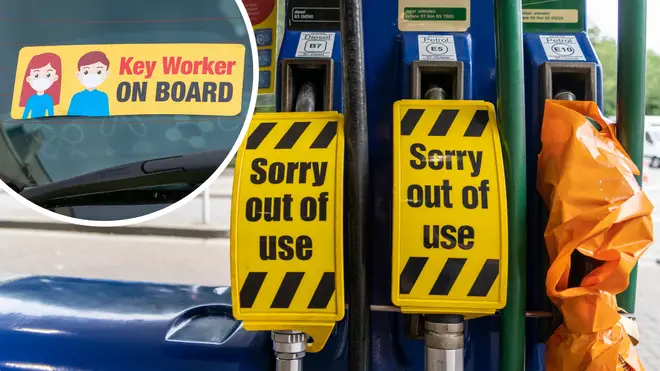
Ian Payne 4am - 7am
28 September 2021, 16:22 | Updated: 28 September 2021, 16:24

The chaos at petrol stations has led to calls for key workers to be given priority access to fuel, as hundreds of forecourts are closed amid a panic buying frenzy.
The crisis is facing "tentative signs" of easing, according to Transport Secretary Grant Shapps.
But amidst long waits and even armed fights in the queues for petrol, one GP has told LBC they have even resorted to sleeping at work to keep their surgery open.
With the upheaval entering its fifth day and suggestions the supply chain disruption could continue for weeks, support for key workers to jump the queue to keep the country running is growing.
So where are these demands coming from? What powers does the government have to give key workers priority fuel access? And who is designated as a key worker?
Read more: Army on standby as fuel crisis enters day five and calls grow for 999 heroes to jump queue
Read more: ‘Knife’ pulled and brawls break out at pumps as fuel madness shows no sign of letting up

GP considers sleeping in work over fuel crisis
The British Medical Association on Monday warned "there is a real risk that NHS staff won't be able to do their jobs,” with health workers unable to get enough fuel to travel to work or outpatient appointments.
The union Unison has called on ministers to use emergency powers to "designate fuel stations for the sole use of key workers", saying: "Essential staff must be able to get to their jobs so they can continue to provide the services so many rely upon.
"Ambulance crews, nurses, care workers, teaching assistants, police staff and other key workers mustn't be left stranded or forced to queue for hours simply to get to a pump."
Read more: Ambulance driver bombarded with abuse on petrol station forecourt while filling up
Read more: Fuel crisis: Panic buying leaves up to 90% of petrol pumps dry in major British cities

Ambulance driver given vile abuse for jumping petrol queue
There has also been political support for the move, with London Mayor Sadiq Khan saying yesterday: "As the current reductions in fuel delivery affect petrol stations across the capital, it is essential that key workers are able to get fuel to travel to work and provide the services our city needs.
"In the fuel crisis of September 2000, the government brought in rules designating specific filling stations for essential workers, enabling the capital to keep moving.
"The government must urgently look at taking the necessary steps putting such measures in place, so that those key workers who have to drive to work can do so."
Read more: UK fuel crisis is 'direct consequence' of Brexit, Michel Barnier says
Read more: 'You couldn't pay me enough': Lorry driver explains why no one wants to drive trucks in UK

Caller holed up at home due to fuel panic-buyers
The government appears to be reluctant to introduce a key worker priority scheme, with ministers instead saying it will be down to individual petrol stations to decide on whether they give priority to staff from certain sectors.
Speaking on Monday evening, Environment Secretary George Eustice said prioritising certain people "overcomplicates things".
Instead the army has been put on standby, with up to 150 military tanker drivers preparing to ship fuel from refineries to local filling stations.
Read more: Fuel industry: 'There is plenty of fuel' with 'normal' demand expected in coming days
Read more: Firefighter's harrowing picture highlights how dangerous it is to carry fuel cans in cars

Army tanker drivers to be put on standby amid fuel supply issues
Despite the apparent reluctance, the government does have the ability to implement a “Designated Filling Station scheme” to give “emergency and critical service vehicles” priority to some fuel stations.
The measures are part of the National Emergency Plan for Fuel, which says the key worker measures will “only be activated in the event of a severe national fuel supply shortage”.
However, it is unclear if this would include key workers' private cars. Already some forecourts have been giving priority access to ambulances and lorry drivers.
Read more: How long could it take to fix the UK fuel crisis?
If private cars were included, it is likely the government would use the same list of key workers as outlined during the pandemic.
The government's list of key workers includes:
During the 2000 fuel crisis, caused by protests over fuel taxes, Tony Blair's government introduced key worker fuel priority using a similar list.